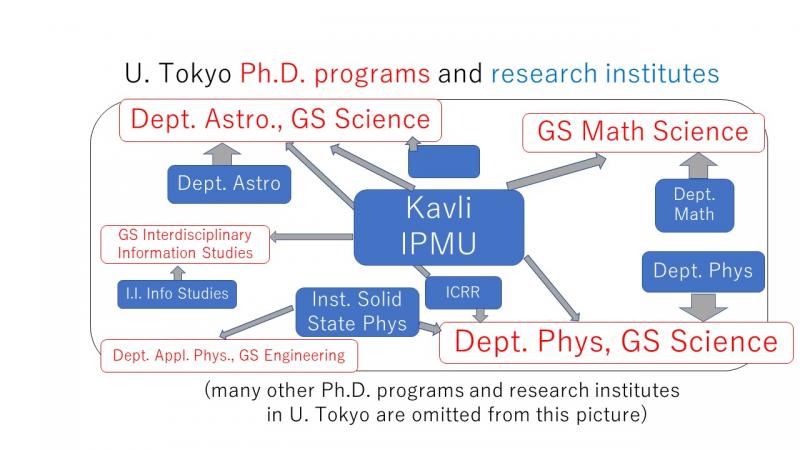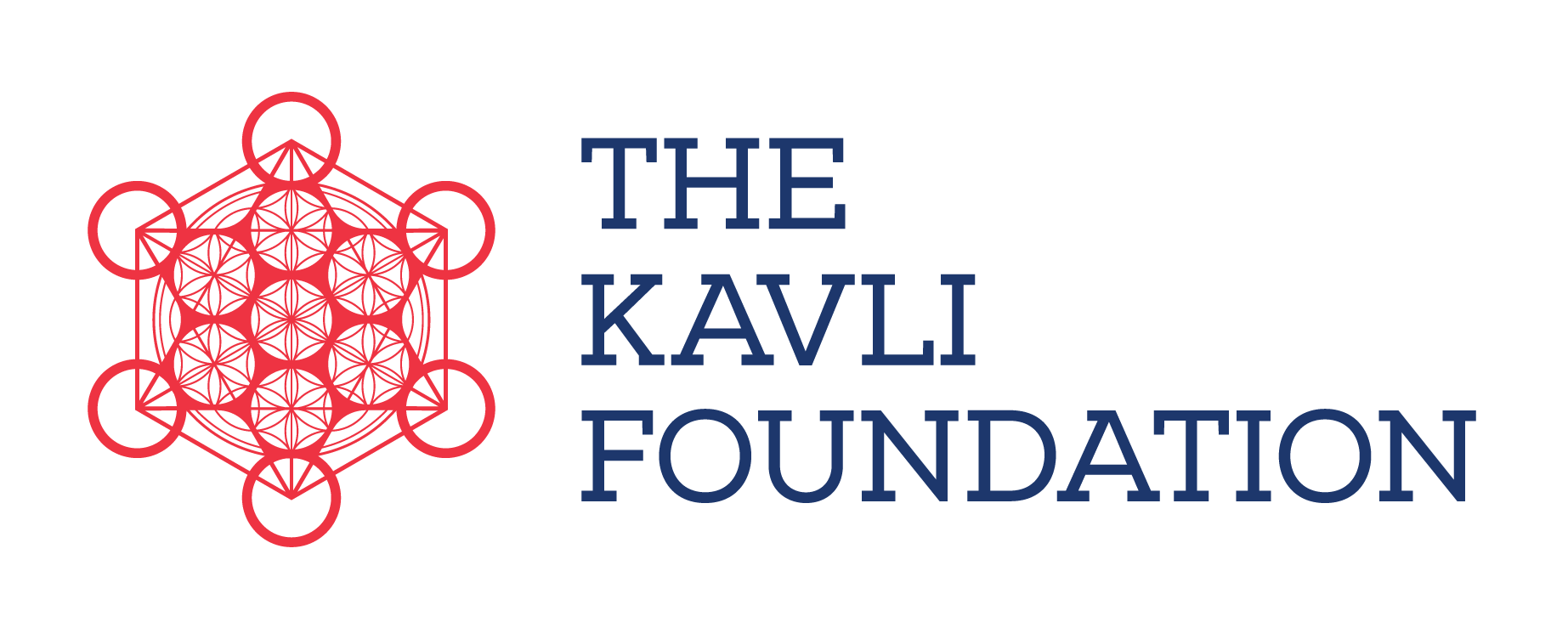Ph.D. Programs at Kavli IPMU (for international students)
Please be aware that this English version (for international students) is different from the Japanese version (for domestic students).
There are two options in doing (at least a part of the) Ph.D. study at Kavli IPMU. One is in the Ph.D. programs of the University of Tokyo, and the other is to take an Oxford option. This page provides a brief explanation of those two options of the Ph.D. study, and also links to necessary information.
For the whole spectrum of research programs at Kavli IPMU (rather than Ph.D. programs), see Kavli IPMU > Research Activities > Research Programs.
The University of Tokyo Ph.D. Programs
Kavli IPMU hosts Ph.D. students through the following Ph.D. programs of the University of Tokyo: Graduate School of Mathematical Science, Department of Astronomy of the Graduate School of Science, Department of Physics of the Graduate School of Science, and Graduate School of Interdisciplinary Information Studies. Those Ph.D. programs individually run the admission process, provide class-room lectures, and set their own criteria for Ph.D.. So, if you are interested in doing Ph.D. study at Kavli IPMU, you are encouraged to apply to those Ph.D. programs.
The official page of those Ph.D. programs are here:
Graduate School of Mathematical Science,
Department of Astronomy, Graduate School of Science,
Department of Physics, Graduate School of Science, and
Graduate School of Interdisciplinary Information Studies.
For the Department of Physics of Graduate School of Science, there is also an informal guide, which summarizes all the key information for international students thinking of the U. Tokyo as one of the options.

Kavli IPMU is a research institute in the University of Tokyo. Research institutes within the University of Tokyo contribute some number of their faculty members to run a Ph.D. program, such as those above. Whereas Kavli IPMU has about thirty faculty members, several among them supervise graduate students in the Graduate School of Mathematical Science, about ten among them participate in Department of Physics of the Graduate School of Science, and a small number of them in the two more Ph.D. programs.
Graduate School of Mathematical Science
List of faculty members who can host a Ph.D. student
Tomoyuki Abe, Yukari Ito, Mikhail Kapranov, Todor Milanov, Hiraku Nakajima, Yukinobu Toda, Masahito Yamazaki
FAQ, common messages (on GS Mathematical Science)
in preparation.
Department of Astronomy, Graduate School of Science
List of faculty members who can host a Ph.D. student: John Silverman
Comments, FAQ: in preparation.
Department of Physics, Graduate School of Science
List of faculty members who can host a Ph.D. student
A1 subcourse (particle theory): Simeon Hellerman, Kentaro Hori, Shigeki Matsumoto, Hitoshi Murayama, Taizan Watari
Some other faculty members at Kavli IPMU also conduct research in particle theory independently, and are interested in being committed to Ph.D. students.
for example, Thomas Melia, Satoshi Shirai
To be a student of Tom or Satoshi in practice, one of the five above needs to be a host scientist (official thesis adviser) in the Department of Physics of the Graduate School of Science.
A2 subcourse (nuclear experiments, accelerator experiments): Takeo Higuchi
A5 subcourse (cosmology theory and general physics theory ): Masahiro Takada, Naoki Yoshida(joint appointment)
A8 subcourse (cosmology experiments/observations, astroparticle experiments): Kai Martens, Tadayuki Takahashi, Mark Vagins, Tomotake Matsumura
FAQ, common messages (on Dept. Phys., GS Science)
[Language Policy] All the class-room lectures provided by the Department of Physics of the Graduate School of Science to Ph.D. students are delivered in English, if there is even one non-Japanese-speaking student.
["for international students"] Department of Physics of the Graduate School of Science runs two separate admission processes: one for domestic students and the other for international students. This web page (for international students) refers only to the latter. The admission process for "domestic students" is explained in the Japanese version of this page.
The admission process for "domestic students" requires the applicants to come to Tokyo to take a written test, and again later to take an oral interview. The written test problem set is available only in Japanese. We call it an admission process for "domestic students" for that reason; the applicants are not required to have a Japanese nationality, permanent or temporal resident status, though.
The admission process for "international students" does not ask the applicants to come to Tokyo; communications can be in English. The admission process for "international students" is open also to Japanese nationals who have had higher education abroad.
See fine prints in the official page of Department of Physics of the Graduate School of Science for more information about who qualifies for which admission process. There are some restrictions on applying for both of the admission options.
[Admission Process] The outline of the admission process for international students is explained in an informal guide. Particularly important are these two messages: (i) A thesis adviser needs to be specified already during the admission process (not after enrollment), and (ii) the admission process is in a two-stage system (preselection by prospective thesis advisers followed by the official selection by Department of Physics of the Graduate School of Science).
[Scholarship Options] see the informal guide (the same page as above).
[Who is open to what? and vacancy information] Within the admission process for international students, there are still multiple channels of applications (as explained in the informal guide). Department of Physics of the Graduate School of Science leaves huge room of discretion to individual faculty members, when it comes to the admission channels they are open to. Some of them host international students only through a few channels; some of them open the door only through the admission process for the domestic students. A deadline for application to the preselection may be set by individual faculty members earlier than that of the application to the official selection. It also happens in some years that a faculty member already has many students to take care of so it is not possible to host one more student starting from the next academic year.
For such information,
visit individual webpages: Watari,
contact directly for others (to find e-mail addresses, visit the invidual pages above).
Cultural and human information studies course, Graduate School of Interdisciplinary Information Studies
List of faculty members who can host a Ph.D. student: Hiromi Yokoyama
See HERE for admission information.
An Oxford Option
There is also an option to enroll in a PhD programme at Oxford University and spend about three years of the time of the PhD program at Kavli IPMU; Kavli IPMU has such an agreement with Department of Physics of the Oxford University.
The admission process and thesis defense are run by the Oxford University; class-room lectures are also provided by the Oxford University in the first year of the programme. A part of research activity is done at Kavli IPMU in this option.
The student applies to Department of Physics at Oxford. During the interview, Kavli IPMU faculty picks applicants who would be eligible for this joint program. Together with an Oxford supervisor, a joint offer is issued to the applicant. Financial support is taken care of by the Kavli IPMU.






